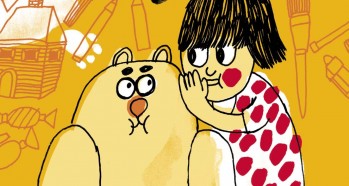Search results for "2010/05/2009/09/what-god-said"
In the early hours
31 March 1976 | Archives online, Fiction, Prose
An extract from Dyre Prins (‘Sweet Prince’, 1975). Introduction by Ingmar Svedberg
Donald Blaadh, a retired businessman, has been called to visit an influential acquaintance in the middle of the night.
He was sitting in the library, listening to Shostakovich, the Leningrad Symphony. The slow crescendo. The insistent march rhythm. Dogged endurance. Indomitability. He switched it off when I came in.
“I can’t sleep,” he said.
“Neither can I.”
He ignored the ironic undertone. “Shostakovich sharpens the decisionmaking faculties, the way chess sharpens the wits,” he said. “A sort of exercise routine … but I forgot, you don’t play chess.”
“No, but I do play the gramophone.”
“To-day I’m going to start you off with a quiz: whose immortal words were these, ‘Minerva’s owl never takes to the air till twilight is falling’?”
“I don’t know.” More…
Lemminkäinen unfazed
30 September 2000 | Archives online, Fiction, poetry, Prose
An English translation by Anselm Hollo of Runo XI from Kalevala 1999, Kai Nieminen’s new translation of the national epic (1849), into contemporary Finnish. Interview with Kai Nieminen by Anselm Hollo
But now it is time to tell about Lemminkäinen, a.k.a. Ahti the Islander. Young Ahti was handsome and cheerful. His mother raised him on the shores of a headland where he went fishing, ate fish and grew up strong smart and straight. But his character had a flaw: a womanizer is what he became, our Lemminkäinen (also known as Wandering Mind). He spent his days chasing the girls, his nights making love to them.
Below and above the surface
13 March 2014 | Extracts, Non-fiction
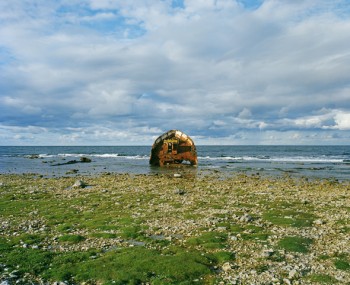
Fårö, Gotland, Sweden. Photo: Lauri Rotko
The Baltic Sea, surrounded by nine countries, is small, shallow – and polluted. The condition of the sea should concern every citizen on its shores. The photographers Jukka Rapo and Lauri Rotko set out in 2010 to record their views of the sea, resulting in the book See the Baltic Sea / Katso Itämerta (Musta Taide / Aalto ARTS Books, 2013). What is endangered can and must be protected, is their message; the photos have innumerable stories to tell
We packed our van for the first photo shooting trip in early May, 2010. The plan was to make a photography book about the Baltic Sea. We wanted to present the Baltic Sea free of old clichés.
No unspoiled scenic landscapes, cute marine animals, or praise for the bracing archipelago. We were looking for compelling pictures of a sea fallen ill from the actions of man. We were looking for honesty. More…
Jarkko Laine Prize 2011
1 June 2011 | In the news
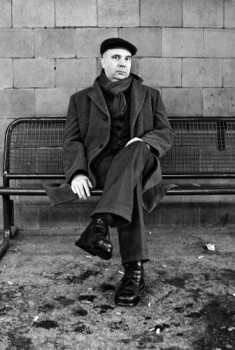
Juha Kulmala. Photo: Lotta Djupsund
The Jarkko Laine Literary Prize (see our news from 6 May), worth €10,000, was awarded to Juha Kulmala (born 1962) on 19 May for his collection of poems entitled Emme ole dodo (‘We are not dodo’, Savukeidas, 2009).
The prize is awarded to a ‘challenging new literary work’ published during the previous two years. Shortlisted were also two novels, Kristina Carlson’s Herra Darwinin puutarhuri (‘Mr Darwin’s gardener’, Otava, 2009) and Erik Wahlström’s Flugtämjaren (‘Fly tamer’, Finnish translation Kärpäsenkesyttäjä, Schildts, 2010).
Jarkko Laine (1947–2006) was a poet, writer, playwright, translator, long-time editor of the literary journal Parnasso and chair of the Finnish Writers’s Union.
Late summer in Tulavall
30 September 1990 | Archives online, Children's books, Fiction
An extract from Mattan från Kars (‘The rug from Kars’). Introduction by Tuva Korsström
Mother Limberg and Apelman’s Anna Lina were sitting together on the steps up to Mother Limberg’s cabin in Mickelgård Street in Tulavall. They were mourning. They were grieving for the old army captain, Alexander Grunnstedt, who had fought in the Caucasus in his youth, had lived alone in the Limberg’s gable room in his old age and then had lost his way in the forest, had a heart attack and been carried off in his coffin by his daughter-in-law.
It was late summer and sunny weather.
‘She could’ve had him buried here,’ said Mother Limberg.
‘She thought it too simple here,’ said Anna Lina. More…
Sealspotting
14 June 2009 | Reviews
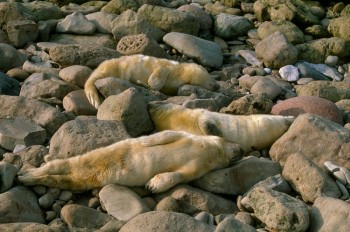
Zzzzzzz! In the grey seal kindergarten babies take a nap after dinner. – Photo: Seppo Keränen
Taskinen, Juha
Paluu Saimaalle
[Return to Lake Saimaa]
Helsinki: WSOY, 2009. 204 p., ill.
ISBN 978-951-0-33745-5
€ 38.90, hardback
Keränen, Seppo & Lappalainen, Markku
Hylkeet [The seals]
Helsinki: Maahenki, 2009. 151 p., ill.
ISBN 978-952-56-5266-6
€ 45, hardback
Sälar
Helsingfors: Söderströms, 2009.
151 p., ill.
Swedish translation: Annika Luther
ISBN 978-951-52-2603-7
€ 45, hardback
The private life of the species of seal that lives only in Lake Saimaa has been carefully investigated lately. Almost everything about this highly endangered species has been revealed, thanks to technological devices such as transmitters that can be glued to their backs…
STOP! WARNING: as I realise that not everybody wants to know what pinnipeds do in their spare time, I suggest you quit reading now, if you aren’t interested in the lives and fates of an obscure group of about 260 mammals that live in a lake in the remote west of Finland.
Oink oink
23 June 2011 | This 'n' that
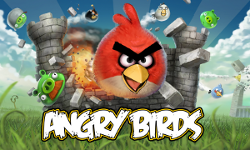 Naturally, here at Books from Finland, we’re keen to use the internet for serious (or not so serious) reading, but at the other end of the scale Finns are garnering considerable success in the world of smartphone games.
Naturally, here at Books from Finland, we’re keen to use the internet for serious (or not so serious) reading, but at the other end of the scale Finns are garnering considerable success in the world of smartphone games.
We don’t like to blow our collective trumpets, but it’s a little-known fact that the phone game Angry Birds, with birds and pigs in the starring roles, is actually Finnish, developed in 2009 by a company called Rovio. As the Helsinki freesheet Metro (31 May) notes, Angry Birds has been downloaded more than 200 million times on different devices since its launch in December 2009.
What is the secret of Angry Birds’ success? ‘I like it because it doesn’t really have any rules and you never know exactly what’s going to happen next,’ says our young reviewer Sophia, 9; her sister, Tia, 5, says ‘I like it because you get to shoot in it.’ To judge by the amount of time they spend playing Angry Birds, they like it a lot.
And how did Angry Birds come about? ‘At the beginning of 2009 our design group went through a number of different options,’ Rovio’s communications director Ville Heijari tells Metro. ‘One of them was angry-looking birds, and everyone fell in love with them right away.’ And what does Heijari himself like best about the game? ‘Definitely the fact that when you make a mistake, the pig laughs at you. That really makes you want to try again.’
In the pipeline is an Angry Birds movie, plus further development of the game itself. ‘So far the world has only seen an glimpse of the birds’ world,’ says Heijari.
In a class of one’s own
18 December 2009 | Reviews
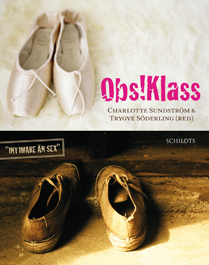 Obs! Klass
Obs! Klass
Red. [Ed. by] Charlotte Sundström & Trygve Söderling
Helsingfors: Schildts, 2009. 288 p.
ISBN 978-951-50-1891-5
€27, paperback
De andra. En bok om klass
Red. [Ed. by] Silja Hiidenheimo, Fredrik Lång, Tapani Ritamäki, Anna Rotkirch
Helsingfors: Söderströms, 2009. 288 p.
ISBN 978-951-522-665-5
€26.90, paperback
Me muut. Kirjoituksia yhteiskuntaluokista
Helsinki: Teos, 2009. 267 p.
ISBN 978-951-851-259-5
€27.90, paperback
At some time in their lives, all members of the Swedish-speaking minority in Finland have been confronted with the phrase ‘Swedish-speaking better people’ [Svenska talande bättre folk], uttered in tones of contempt. Encouraged by news and entertainment media with little regard for the consequences, Finland’s Finnish-speaking majority is hopelessly fascinated by the image of us Finland-Swedes as a uniform and monolithic haute bourgeoisie that resides in the coveted Helsinki neighbourhoods of Eira and Brunnsparken. More…
Who for? On new books for children and young people
29 January 2010 | Articles, Non-fiction
Books have a tough time in their struggle for the souls of the young: more titles for children and young adults than ever before are published in Finland, all of them trying to find their readers. Päivi Heikkilä-Halttunen picks out some of the best and most innovative reading from among last year’s titles
Nine-year-old Lauha’s only friend and confidant is her teddy bear Muro, because Lauha is an outsider both at home and at school. The children’s novel Minä ja Muro (‘Muro and me’, Otava), which won the 2009 Finlandia Junior Prize, provoked discussion of whether it was appropriate for children, with its oppressive mood and the lack of any bright side brought into the life of the main character in its resolution. More…
Words of feeling
31 March 2002 | Fiction, poetry
Poems from Vain tahallaan voi rakastaa (‘You can only love deliberately’, WSOY, 2001)
The musicians of Bremen (Self-portrait as a five animals)
People say man’s above all the other beasts.
I decided to prove that – and first turned poet
and then painfully became a flying horse, celebrating its freedom
on great shivering brawn. They captured me and put me to pulling
loads, and, seeing I endured everything docilely, they said,
He’s like the Giant Atlas, or Hanuman, the upholder of the world.
And they whipped me and sat on my back and finally
buried me alive. I became a pig and gorged my bellyful and my senses full
and it horrified people, who said: He’s a disease, an epidemic, Death itself.
And they cut my ears and blinded me and sliced my belly in two.
And I turned into a dog and learned everything I was taught and they said,
He’s completely without a will, like the angels, like an ascetic, and a prophet.
And they drove me out to wander the streets and the wildernesses. And in the desert
I turned into a tiger and people shouted in terror
What on earth
has God done – look, he’s Satan himself. And they shot me
from an elephant’s back. And I died into a cock and people woke up and shouted,
The healer of the world! And whenever I sing, because I only sing untold-to,
People wring my neck. More…
A long dream
9 October 2009 | Fiction, Prose
A short story from Jälkikasvu (‘Offspring’, Otava, 2009)
‘I was eating a late breakfast, without a care in the world, when it happened.’
He snaps off the recorder. He has said the same thing three times now, but he always loses his train of thought right there. Why is it so difficult to continue? In his mind, the next part feels quite clear, but the words simply won’t come out of his mouth. He ought to say that his wife left him yesterday, on the twelfth of February, at 10:48 AM, following a three-minute fifteen-second briefing. More…
Dead calm
31 December 2007 | Fiction, Prose
Extracts from the novel En lycklig liten ö (‘A happy little island’, Söderströms, 2007)
In the beginning the computer screen was without form, and void, and the scribe’s fingers rested on the keyboard.
The scribe bit his lower lip. His gaze travelled like a fly from the workroom’s crowded bookshelves to the rocking chair in front of the window and the coloured prints of birds on the walls. He went out into the kitchen and drank some water. Then he sat down in front of the computer again.
To create from nothing a fictitious world assisted only by the tools language places at our disposal, surely that must be a great and exacting undertaking!
The scribe hesitated and racked his brains for a long time before finally typing the first word: ‘sky’. Then after long thought he typed another word: ‘sea’. More…
The Session
30 June 1982 | Archives online, Fiction, Prose
Pappas flicka (‘Daddy’s girl’, 1982), an extract of which appears below, is published in Finland by Söderstrom & C:o and in Sweden by Norstedt. The Finnish translation is published by Tammi. Introduction by Gustaf Widén
At first I say nothing, as usual.
Dr Berg also sits in silence. I can hear him moving in his chair and try to work out what he’s doing. Is he getting out pen and paper? Or perhaps he has a tiny soundless tape-recorder he is switching on.
Or is he just settling down, deep down into his armchair, one leg crossed over the other, like Dad used to sit? I used to climb up on to his foot. The he would hold my hands and bounce his foot up and down, and you had to say “whoopsie” and finally with a powerful kick, he would fling me in the air so that I landed in his arms.
I have worked it out that the little cushion under my head is to stop us lunatics from turning our heads round to look at Herr Doktor.
It would certainly be nice to sit bouncing up and down on Dr Berg’s foot. His ankle would rub me between my legs …
I soon start feeling ashamed and blush.
“Mm,” says Dr Berg, as if reading my thoughts. Or can he see my face from where he is sitting? I try rolling my eyes up to catch a glimpse of him, but all I can see is the ceiling with all its thick beams.
“I seem to have been here before,” I say. More…
Daughter of Cain
30 June 1985 | Archives online, Fiction, Prose
An extract from the novel Kainin tytär (‘Daughter of Cain’, 1984). In the following extract Anna and Risku spend a single night recalling the early days of their relationship; Anna is in the country, Risku is in the city. Introduction by Soila Lehtonen
Anna
The moon hangs before the bosom of the sky, a slender crescent, but giving light all the same.
On the horizon a black, glimmering line emerges from the water. It is the skerry, a low, lone rock.
I shut off the motor. The sea laps minutely against the side of the boat. This far out there are no longer any birds.
The silence here is deeper than even that of an empty room.
The skerry is as black and glistening as the back of a pike.
Light is matter, it’s never steady.
Whatever is understood in life is understood in a sudden blue illumination, like lightning cleaving the night to expose the landscape – shadows, hollows and all. More…
Air, blue and gold
16 January 2014 | Fiction, poetry
Poems. Introduction by Tuula Hökkä
The arch bridge
From Ylitse vuoren lasisen (‘Over the glass mountain’, 1949)
And God said: to others I’ll give other tasks, but the task I’ll give to you
is to make a curving bridge, my child, with an arch that’s round and true.
For everywhere around the earth human beings are laden with gloom,
and they’ll come to cross an arching bridge in their anguish and their doom.
Make a bridge that spans the precipice, a bridge over the abyss,
one that shines to my glory with radiance, sparkling like this.
I said: They will come with heavy boots, and heels caked with clay –
how can my bridge withstand their weight, yet also shine this way,
not tarnish or break apart as their crowding presence nears?
And God said: well, it can only be done by means of blood and tears.
Your heart is stronger than mountain rock, the ore that’s buried there –
Put a piece of it into the bridge support, and you’ll get the bridge to bear.
Add a piece of the hearts of those you love, and I know they won’t condemn,
but will surely grant you forgiveness if you make a bridge for them.
Make a bridge to the glory of God, my child, make a bridge with arching light
that will span the depths and shine for ever, with radiance sparkling bright.
Don’t lock the sorrow out of your heart as the bridge you make appears.
Nothing gleams more beautifully than the brilliance of pure tears. More…

